
Marek Dabrowski
Dr. Marek Dabrowski is a Non-Resident Scholar at Bruegel, co-founder and Fellow at CASE - Centre for Social and Economic Research in Warsaw and Visiting Professor at the Central European University in Vienna.
He was Chairman of the CASE Supervisory Council and its President of Management Board (1991-2011), Chairman of the Supervisory Board of CASE Ukraine in Kyiv (1999-2009 and 2013-2015), Member of the Board of Trustees and Scientific Council of the E.T. Gaidar Institute for Economic Policy in Moscow (1996-2016), Professor at the Higher School of Economics in Moscow (2014-2022), and Fellow under the 2014-2015 Fellowship Initiative of the European Commission – Directorate General for Economic and Financial Affairs. He is a former First Deputy Minister of Finance of Poland (1989-1990), Member of Parliament (1991-1993) and Member of the Monetary Policy Council of the National Bank of Poland (1998-2004).
Since the end of 1980s he has been involved in policy advising and policy research in Azerbaijan, Belarus, Bosnia and Herzegovina, Bulgaria, Egypt, Georgia, Iraq, Kazakhstan, Kyrgyzstan, Macedonia, Moldova, Mongolia, Montenegro, Poland, Romania, Russia, Saudi Arabia, Serbia, Somali, Syria, Turkmenistan, Ukraine, Uzbekistan and Yemen, and in a number of international research projects related to monetary and fiscal policies, growth and poverty, currency crises, international financial architecture, perspectives of European integration, European Neighborhood Policy, trade policy, and political economy of transition.
He has also worked as a consultant in a number of EU, World Bank, IMF, UNDP, OECD and USAID projects. Marek is the author of several academic and policy papers, and editor of several book publications.
Disclaimer of external interests
Featured work

The impact on the European Union of Ukraine’s potential future accession
This report evaluates the impact on the EU of a possible EU accession of Ukraine, focusing on economic consequences and institutional developments.
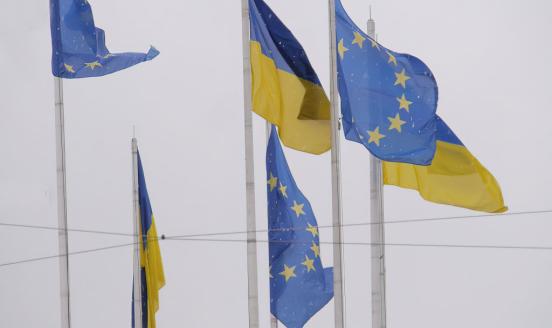
Ukraine’s path to European Union membership and its long-term implications
The war complicates the accession process, but Ukraine can work progressively towards meeting the entry conditions
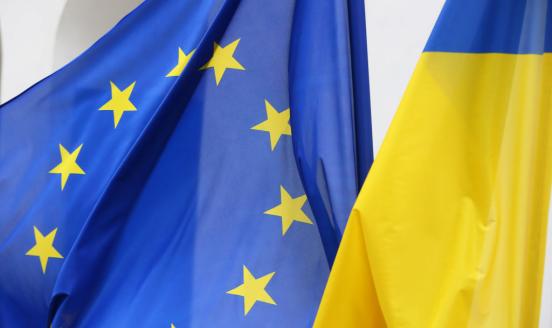
To become a geopolitical player the European Union needs Treaty change
The EU will never become a serious geopolitical player without reducing national veto power.
Changes in commodity prices as the factor triggering financial crises
Factors determining public debt sustainability
Financial crises, their forms, interrelations between them, and crises’ origins
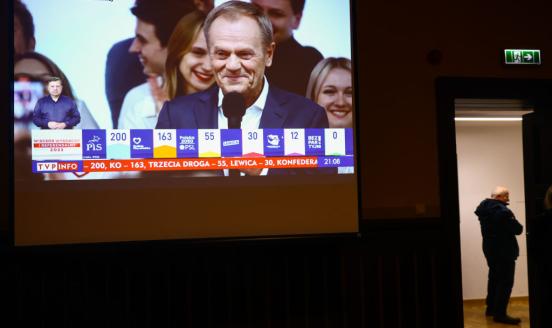
Poland: hope for rule-of-law correction, but serious economic challenges ahead
Obstacles created by Poland’s outgoing government and the deteriorating economic situation make the post-election outlook highly challenging.

European Single Market: The Unfinished Business

European Union grain imports from Ukraine: the right decision and a cynical rebellion
The European Commission was right to let restrictive measures on Ukrainian grain lapse, but the decision has had negative side-effects.
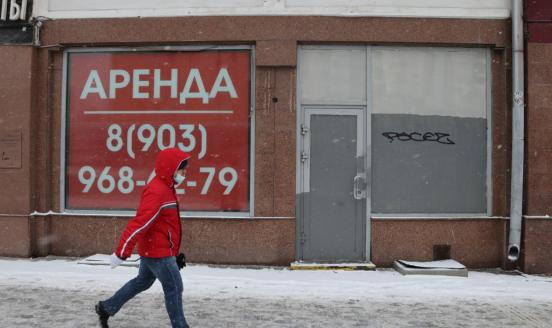
The Russian war economy: macroeconomic performance
The Russian economy has performed better than many expected since the war in Ukraine started, though the financial burden will be felt for some time.
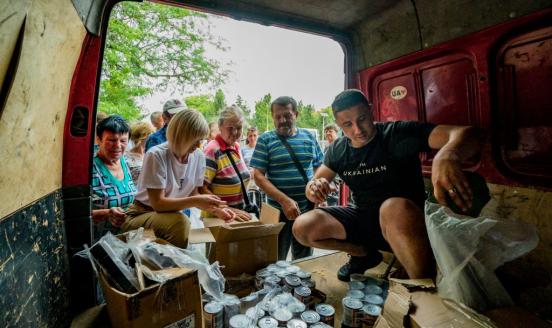
The Ukrainian war economy
This paper analyses Ukraine’s war economy management and performance, according to information available in June 2023.

Did the European Union Dodge the Energy Bullet?

Thirty years of economic transition in the former Soviet Union: Microeconomic and institutional dimensions
The transition experience in the former Soviet Union region has demonstrated a correlation between political and economic reforms.
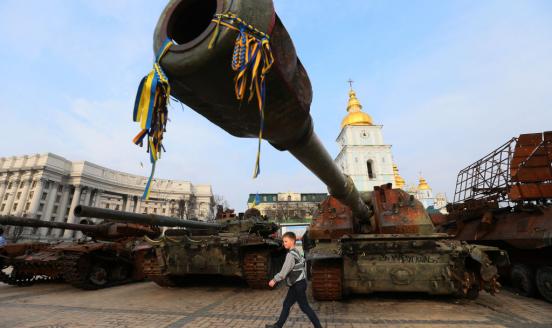
Reforming the Ukrainian Economy and State: The Unfinished Business
Ukraine will need additional international aid to rebuild its economy and infrastructure when the war ends.

A limping transition: the former Soviet Union thirty years on
The purpose of this essay is to assess where FSU countries are 30 years after the break up of the USSR in terms of their economic and political system

Whither EU Fiscal Rulemaking?
Since fiscal discipline is essential for euro stability, any new governance framework must minimize the risk of cross-border negative spillovers.
The Contemporary Russian Economy: A Comprehensive Analysis
Financial Globalization, Financial Regulation, and Macroeconomic Policy
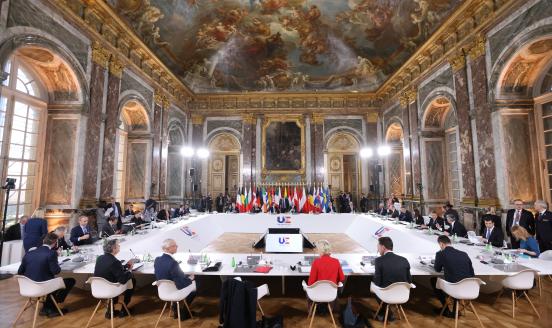
EU Enlargement in a New Light
A collection of articles compiled following a joint Bruegel-Intereconomics event on EU enlargment.

Is the European Union on course to become the big loser in the global tech race?
To sustain the innovativeness of its economy, Europe needs reforms.
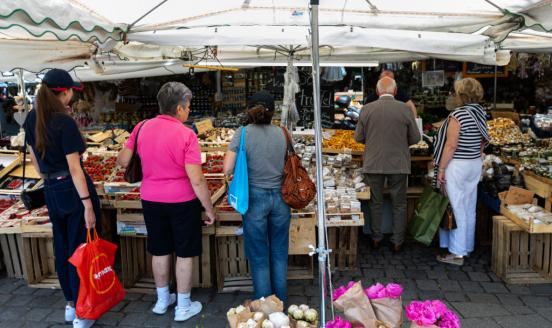
Central banks have been too slow in responding to higher inflation
Tackling inflation requires monetary and fiscal policy tightening. It should be done quickly to avoid building up inflationary inertia & stagflation

EU enlargement in a new light
What would increase government support around EU enlargement, and what role could membership play in future peace talks?
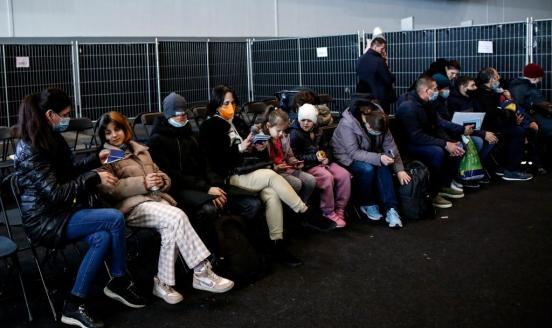
A new Thessaloniki offer: the aspirations of Georgia, Moldova, and Ukraine to join the EU
The European Union should grant candidate status to Georgia, Moldova and Ukraine, as part of a long-term stabilisation strategy.

Fiscal arithmetic and risk of sovereign insolvency
The record-high debt levels in advanced economies increase the risk of sovereign insolvency. Governments should start fiscal consolidation soon in an
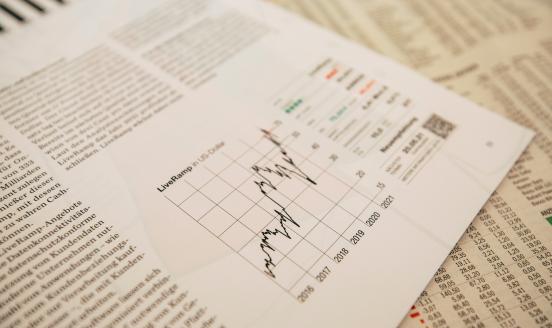
Letter: Declining investment may explain why rates are low
Perhaps an analysis of the causes of the declining investment rate would bring us closer to explaining why real interest rates are so low.

Monetary arithmetic and inflation risk
Between 2007 and 2020, the balance sheets of the European Central Bank, the Bank of Japan, and the Fed have all increased about sevenfold. But inflati

The socio-economic consequences of COVID-19 in the Middle East and North Africa
Confronted with COVID-19, high-income Gulf countries have done better than most of their middle- and low-income neighbours; Jordan and Morocco are als
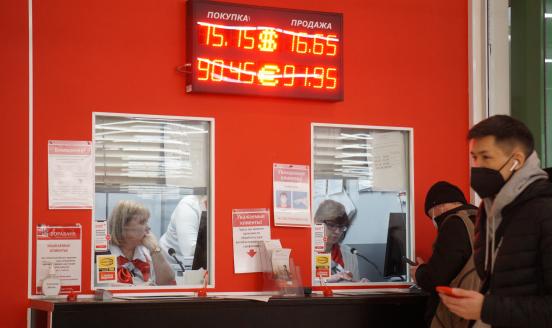
Is a dollar crash coming?
Even if a sovereign debt crisis is avoided, the public debt burden will negatively impact growth.

Economic Crisis in the Middle East and North Africa
In the 2010s, the economic outlook of the countries in the Middle East and North Africa region deteriorated, with numerous long-term socio-economic an

Economic reform in Belarus: how can we overcome old legacies and dependency and what can Europe do?
Political change in Belarus also requires deep economic reforms - what next for the country?
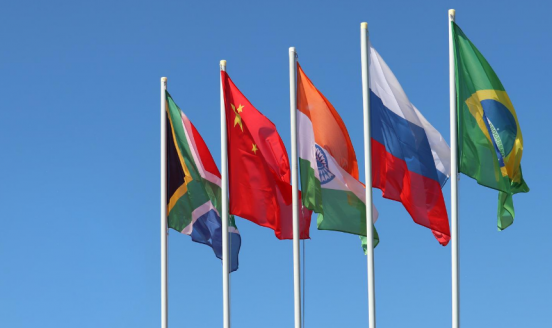
Emerging market central banks and quantitative easing: high-risk advice
Central banks in emerging markets with weak currencies should not resort to unorthodox monetary tools such as quantitative easing as a response to the

Ukraine: trade reorientation from Russia to the EU
Over the past five years conflict has led to a deterioration of Russo-Ukrainian economic relations while ties with the EU have been deepened. This shi
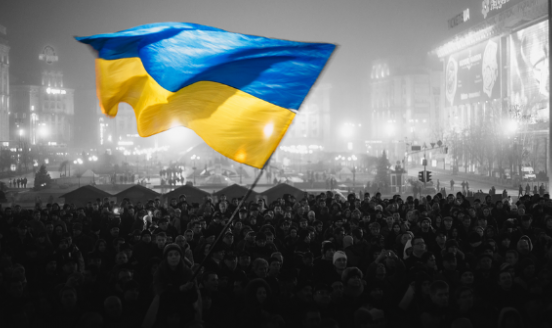
Six years after Ukraine’s Euromaidan: reforms and challenges ahead
T he political events of early 2014 and the conflict with Russia had a strong negative impact on the Ukrainian economy.
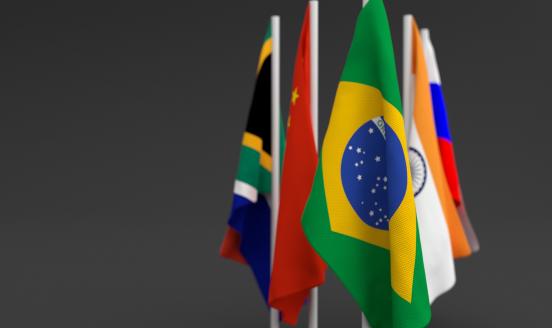
Is COVID-19 triggering a new emerging-market crisis?
Emerging economies have received little attention in the economic debate regarding the COVID-19 pandemic, yet the performance of their primary market

Can the EU overcome its enlargement impasse?
The ‘new enlargement methodology’ may help overcome the impasse triggered by the inability of the European Council to open accession negotiations with
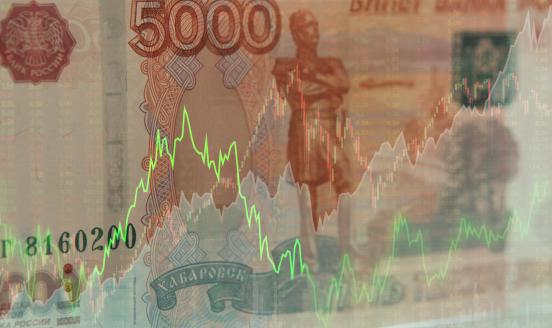
Factors determining Russia’s long-term growth rate
This paper’s main conclusion is that Russia’s economy cannot grow at the pace recorded in the early and mid-2000s because of the different external en

Could the U.S. economy be experiencing a hidden tech-driven productivity revolution?
In the last decade, most advanced economies have grown more slowly than before. Slower growth has frequently been seen as a legacy of financial crises
Russian economy at the crossroads: how to boost long-term growth?
Russia’s convergence to advanced economy income levels has stalled. Long-term growth prospects are still obstructed by sluggish productivity growth, l

Questions to the Commissioner-designate for Neighbourhood and Enlargement
Historically, the EU enlargement process played a powerful role in encouraging the EU candidates and potential candidates to conduct fundamental polit
The Ukrainian economy: the way forward after a year of political turbulence
What can Ukraine do to foster economic growth? How can the EU and other international partners help Ukraine with this process?
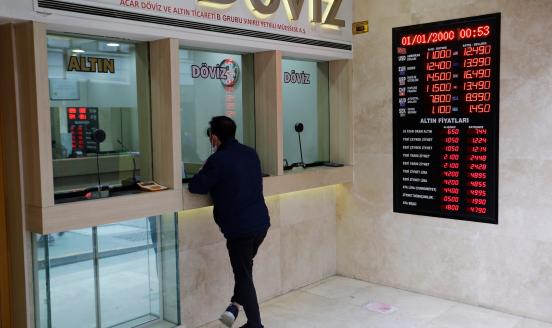
Can emerging markets be a source of global troubles again?
According to popular perception, emerging-market economies have not experienced serious macroeconomic and financial turbulence since the beginning of

ICT revolution key to populist political surge
Developments in digital technology have prompted a ‘tabloidisation’ of traditional media, created opportunities for the misuse of information online,

Russia's foreign policy does not help its economic modernisation
In the highly interdependent modern world, a country’s economy and its foreign policy are strongly linked. A country’s foreign-policy ambitions should

Russia's growth problem
After the 2014-2016 currency crisis, Russia’s economy has returned to growth, albeit at a slow pace. In this Policy Contribution, the authors analyse
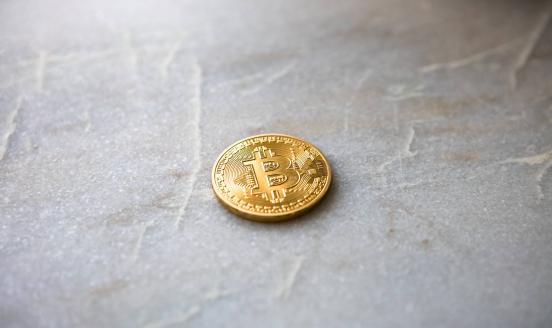
Can virtual currencies challenge the dominant position of sovereign currencies?
Marek Dabrowski and Lukasz Janikowski analyse why private money has historically failed in competition against sovereign currencies and what it means

Economic policy challenges in Southern and Eastern Mediterranean
For a long time, southern and eastern Mediterranean countries struggled with serious socio-economic challenges and dysfunctional economic systems and

Examining interrelation between global and national income inequalities
The author contributed to the new issue of 'The Russian Journal of Economics' with a paper on the global dimension of the inequality trends

Is this time different? Reflections on recent emerging-market turbulence
Since the beginning of 2018, currencies of two large emerging-market economies – Argentina and Turkey – suffered from substantial depreciation. Other

Policy responses for an EU-MENA shared future
In the third edition of the "Platform for Advanced & Emerging Economies Policy Dialogue" we will discuss trade flows and trade policy between Europe a

Are economic and political freedoms interrelated?
Democracy has not always accompanied market economy. But in modern societies, economic and political freedoms are increasingly interconnected. Democra
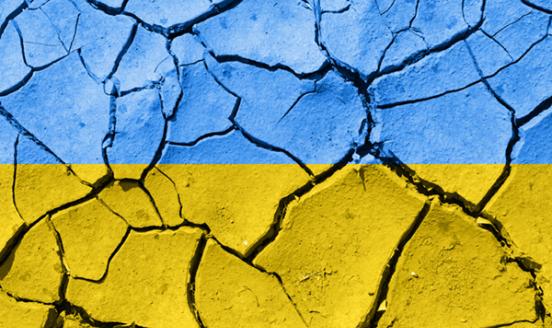
Ukraine: The struggle for reforms continues
The modernisation of the Ukrainian economy and state continues to develop at an unsatisfactory pace due to a lack of pro-reform political consensus. T

Free trade in Africa: An important goal but not easy to achieve
The signing of the African Continental Free Trade Agreement and the Kigali Declaration may signal a new push towards economic integration on the Afric

The (economic) ties that bind: The western Balkans and the EU
The western Balkan economies are already closely integrated with the EU; the EU is their largest trade partner, their largest source of incoming forei

The Western Balkans on the road to the European Union
Given its geographical location, the region is important to the EU in terms of security, stability, trade and transit routes. The Western Balkan count
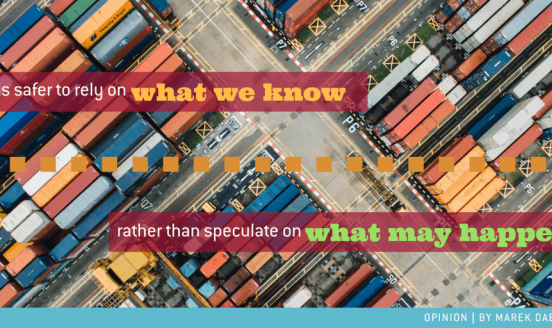
It is safer to rely on what we know, rather than speculate on what may happen
"Does the Conventional Wisdom About Productivity Need To Be Reconsidered?" On a recent collection of opinions, Marek Dabrowski was invited to give his

Central Asia—twenty-five years after the breakup of the USSR
Central Asia consists of five culturally and ethnically diverse countries that have followed different paths to political and economic transformation

Euro-area enlargement: a new opening?
8 of the EU27 have not yet joined the Euro, and progress in euro-area enlargement seems to have stalled. Commission President Juncker wants to give ne
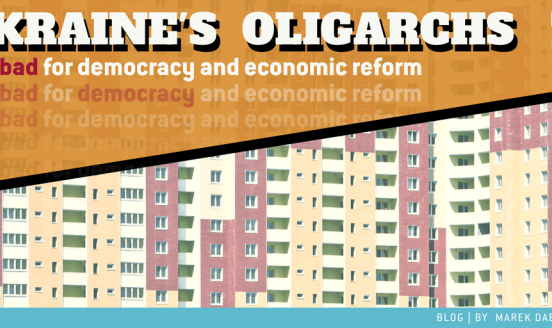
Ukraine’s oligarchs are bad for democracy and economic reform
Ukraine’s late and incomplete economic reform created a class of super-wealthy oligarchs who now stand in the way of further liberalisation. The oliga

Ukraine’s unfinished reform agenda
This Policy Contribution analyses the Ukrainian economic, institutional and political reforms of 2014-17 in terms of their sustainability and complete

Central Asia at 25
After a decade of growth based on hydrocarbon booms, Central Asian countries are faced with increasing challenges to complete their transitions to a m
What are China’s global economic intentions?
At this January's Davos meeting, Chinese President Xi Jinping announced to a surprised audience that China would be the world’s new champion of global
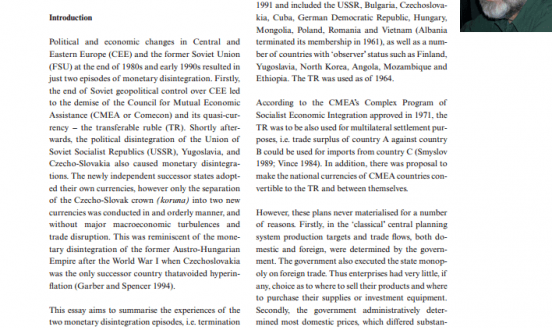
Collapse of the Ruble zone and its lessons
This essay, published by CESifo, aims to summarise the experiences of the two monetary disintegration episodes, i.e. termination of settlements in TR
The EU should not retaliate against Trump’s protectionism
If the US moves ahead with Republican plans to introduce a border adjustment tax, the EU will need to decide on its response. Marek Dabrowski argues t
How to balance sovereignty and integration in a voluntary EU
The principle of voluntary membership is a central value of the EU project, but it is also a source of many of its problems. How can the member states
Challenges to debt sustainability in advanced economies
The gross general government debt-to-GDP ratios in many advanced economies have reached the highest levels in peacetime history and continue to grow,
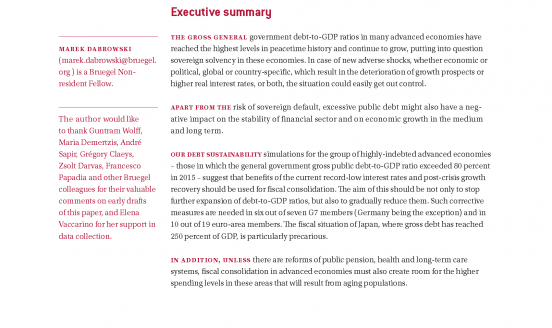
Are advanced economies at risk of falling into debt traps?
One of the consequences of the global financial crisis has been rapid growth in public debt in most advanced economies. This Policy Contribution asses
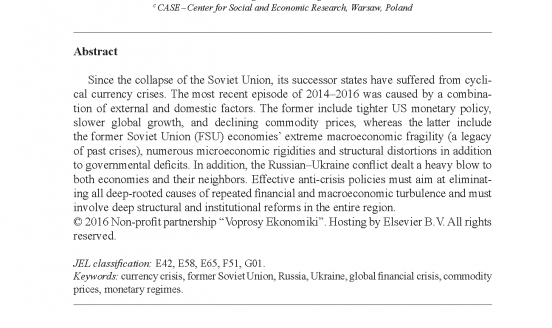
Currency crises in post-Soviet economies — a never ending story?
This paper offers an updated and comprehensive analysis of the currency crises in Russia and the former Soviet Union economies.
Iran: from isolation to economic cooperation
With some sanctions temporarily lifted, now is the chance for Iran to reintegrate into the global economy and political system. But comprehensive econ
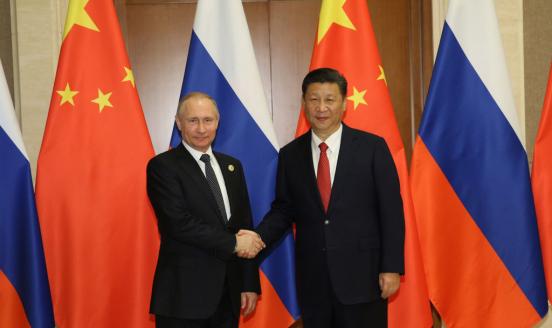
China-Russia relations and their impact on Europe
The economic ties between China and Russia are growing. How will this relation affect Europe?
Concessions offered Britain are key in Brexit debate
The concessions granted to the United Kingdom will encourage eurosceptic forces to demand special institutional solutions for other countries.
New perspectives for economic cooperation with Iran
The lifting of international sanctions will have a big impact on the economic relationship between Iran and the rest of the world.
Core and periphery: different approaches to unconventional monetary policy
Compared with the ‘core’ of the world economy, emerging markets have limited room for manoeuvre when it comes to applying unconventional monetary poli
Seven Years after the Crisis: Intersecting Perspectives
First edition of the annual "Platform for Advanced & Emerging Economies Policy Dialogue"
EU Association Agreement could help Ukraine to reform
Ukraine’s closer ties with the EU have been controversial. The Association Agreement is now facing a referendum in the Netherlands. But what exactly i
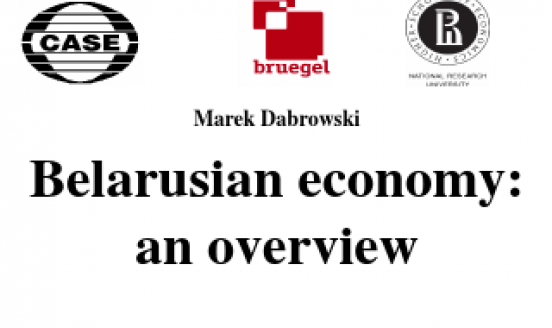
Belarusian economy: an overview
Presentation at the European Parliament – Delegation for Relations with Belarus.
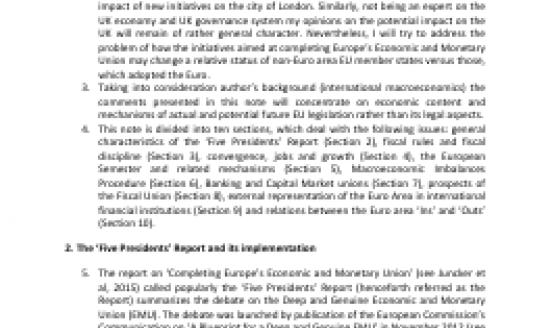
Completing Europe's economic and monetary union
UK House of Lords European Union Committee’s Call for Evidence on ‘Completing Europe’s Economic and Monetary Union’.
Brexit and the EU-UK deal: consequences for the EU
The debate on Brexit focuses on the economic and political consequences for the United Kingdom, but ignores the impact of the new EU-UK agreement on t
Belarus: time to reform
Belarus must speed up its transition to a market economy, in order to return to growth and to avoid a new balance of payments crisis. But such reform
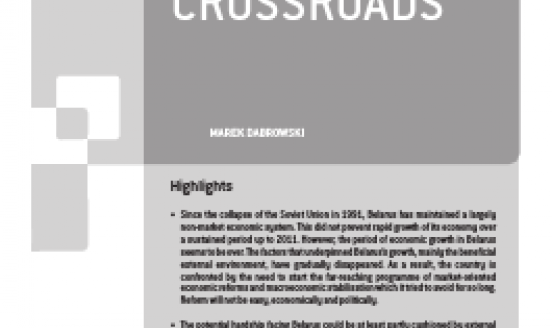
Belarus at a crossroads
Despite the slow pace of market reforms, the Belarusian economy recorded quite impressive growth until recently. However the Belarus growth ‘miracle’
The impact of the oil-price shock on net oil exporters
In the second half of 2014 and early 2015, international oil prices approximately halved. What have been the consequences of this sharp decline on net
The systemic roots of Russia’s recession
To understand the deep causes behind Russia's recession, we must look at the history of the Russian transition and its partial reversal.
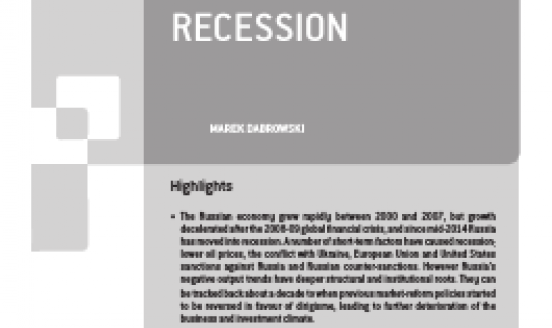
The systemic roots of Russia’s recession
Recession in Russia has become a fact since mid-2014. What are the structural and institutional roots behind it?
Five Lessons on Greece
A reflection on the experience of Greece and other countries who have implemented rescue programs
Greece: from default to Grexit?
The government of Greece has rejected the creditors’ conditions of the continuing bailout program and is heading to imminent default on its obligation
The slow-reform trap
Ukraine is perhaps the most convincing example of a victim of slow reform. Since independence in 1991, it has missed several political windows of oppo
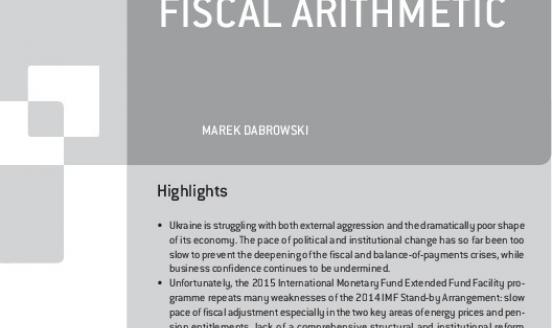
The harsh reality of Ukraine’s fiscal arithmetic
In this Policy Contribution Marek Dabrowski argues that Ukraine must accelerate and better manage its reform process so as to overcome fundamenta
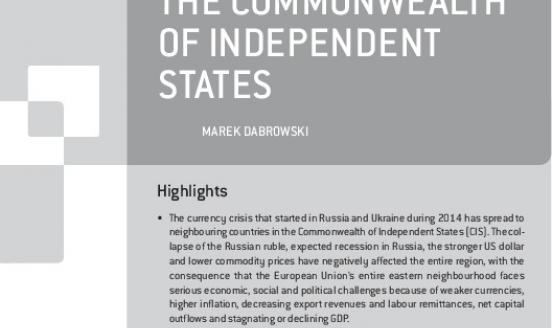
It’s not just Russia: Currency crisis in the Commonwealth of independent states
This Policy Contribution analyses the dynamics of currency crises in Russia and Ukraine and their regional contagion, with attention to changes in nom
Central and eastern Europe: uncertain prospects of economic convergence
This year countries of Central and Eastern Europe celebrate two important anniversaries: 25 years since the beginning of post-communist transition (19

Ukraine: Can meaningful reform come out of conflict?
Ukraine urgently needs a complex programme of far-reaching economic and institutional reform, which will include both short-term fiscal and macroecono